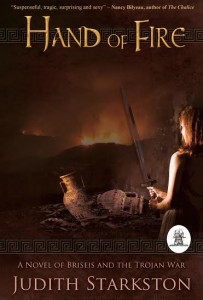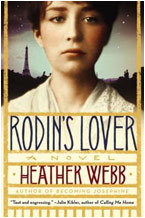I’m delighted to welcome Judith Starkston, historical novelist and researcher extraordinaire to Between the Sheets. Judith’s debut novel HAND OF FIRE set in the ancient world follows the story of Briseis, the face that caused war and lover to Achilles. Judith answers all of our burning questions below.
What is it about this era that’s seduced you? Are there any other eras about which you would like to write?
 The seducer was an epic poem, rather than the era itself. As an undergraduate I fell in love with Homer’s Iliad. Over the years the poem continued to move me so much that there were sections that I couldn’t teach without getting teary-eyed. It was a long time after the original collegiate crush (I went to college in the Jurassic Age, if I recall correctly) that the period itself wormed its way into my heart so thoroughly, and the pathway of that seduction was the process of writing fiction.
The seducer was an epic poem, rather than the era itself. As an undergraduate I fell in love with Homer’s Iliad. Over the years the poem continued to move me so much that there were sections that I couldn’t teach without getting teary-eyed. It was a long time after the original collegiate crush (I went to college in the Jurassic Age, if I recall correctly) that the period itself wormed its way into my heart so thoroughly, and the pathway of that seduction was the process of writing fiction.
While teaching the Iliad, I kept wondering with my students how Briseis, the young captive woman who sparked the conflict between Achilles and Agamemnon, could possibly have loved Achilles—which is what Homer shows us. The half-immortal Greek killed her husband and brothers, destroyed her city and turned her from princess to slave—hardly a heartwarming courtship. She’s central to the plot of the Iliad and yet she gets only a handful of lines. In those few words, the one clear notion expressed is her sorrow at being parted from Achilles.
I should say I always liked Achilles, the existential hero who calls the whole war into question—which shows he’s no brainwasher—so the answer wasn’t some ancient version of Stockholm Syndrome. I started exploring who Briseis could be that would solve this psychological puzzle and that led me to novel writing.
As you know, to write a good historical story you have to build a totally absorbing world that pulls your reader back in time. For that, the writer has to know far more than she ever actually includes. Her knowledge has to be deep enough that a few deft strokes paint the setting and atmosphere.
So I started digging away and became much less the literary lover and much more the archaeological and historical lover. Who could resist a legendary city like Troy with towering citadel walls and room after room of golden splendor? In my heart and imagination, the poetry melded with the romance of the physical remains of the era.
I might move into other eras—certainly writing in the current world has an ease and appeal when I’ve done it in short stories—but for now I’ll be staying in the ancient world of the Trojans and their cultural cousins and allies the Hittites.
The amount of research you put into the novel must have been epic. Can you talk a little bit about how you approached such a gargantuan task? Also, was there a favorite place you visited in your travels?
From various university libraries I’ve read the scholarly discussions and evidence. It’s a long leap from there to enjoyable fiction, but that’s the base.
While the iconic city of Troy that is at the center of my novel gets most of the popular attention, the scholarship primarily focuses on the mighty Hittite empire right next door to Troy. Vast Hittite libraries of cuneiform tablets have been excavated and translated in the last decade or so. We now know Troy followed the same cultural, religious and political traditions as the Hittites, so I used the rich information about the Hittites to build Briseis’s world.
In addition, I have travelled in Turkey where Troy was located, spent hours studying museum collections, talking with archaeologists, and experiencing firsthand the geography of the settings of my book.
One of my favorite travel days was when we went to the area where the city Briseis grew up in, Lyrnessos, is traditionally said to have been located. No one’s ever found the actual site—perhaps Achilles destroyed it too thoroughly or perhaps the legends about Briseis are just that—legends. It doesn’t matter to the flesh and blood woman I’ve created. She’s quite sure she’s real. With my husband and two grown children, we climbed the foothills on the far side of Mount Ida from Troy, looked out over the peaks to the blue Aegean in the distance, and explored a village that looked for all the world like a Bronze Age town—mudbrick houses, communal wood ovens and orchards of olives and pomegranates. We befriended an old lady who shared her one room mud house with a goat and a kitty. She brought out olives and delicious plums to eat, and I kept her cheerful, deeply lined face in my mind as I wrote Briseis’s nurse, Eurome—one of my favorite characters in Hand of Fire.
Would you say you resemble Briseis, your protagonist, in any way? How so?
One of the central themes that I explore in Hand of Fire is women’s strength—where it comes from and why some women have such deep wells of it. Certainly one of those sources is an optimistic outlook and an unwillingness to stay focused on the bad in life that you can’t fix. I, thank goodness, have never had to deal with the degree of tragedy and loss that Briseis goes through, but within the easier circumstances of my life, I do find in myself that kind of strength from a positive outlook. Briseis also has a tendency to speak first, think later when she’s riled up, and unfortunately I could write that trait from first hand experience. Her gleaming red-gold hair and appearance “like Aphrodite,” as Homer puts it, I can in no way claim!
Covers are so important when selling novels. Did you have input into how yours was created? Would you say it reflects elements you were hoping to convey in the story?
I did have some input—although I am in no way skilled in visual arts so my contribution was limited. I like the sense of ominous danger that the burning on the horizon suggests and the way it complements the title. I like the presence of a determined woman. My son worried that having a sword in Briseis’s hand would suggest a warrior princess kind of book—which Hand of Fire isn’t—but Briseis does take up a sword and other weapons at some key moments and the willingness to do all she can to defend her family and people is central to the novel, so that works for me also. I offered some ideas to suggest a Greek/Trojan context. Originally there was nothing historical about the cover, more sci-fi or fantasy, and the sword looked suspiciously like a light saber. I had a heck of a time finding an available photo of a sword even close to authentic and then, after the cover was complete, during a research trip I took this spring to Turkey and Cyprus, I found many examples to photograph in a couple museums I’d hadn’t been to previously. But isn’t that the way life always turns out?
What message would you like your readers to take away with them?
Despite being a book about war with a lot of death and violence, the fundamental theme of Hand of Fire is one of hope. I think people will come away with a renewed sense of the resiliency of humanity and of women in particular.
Can you talk about what your next project is?
I’m in the middle of a historical mystery featuring the Hittite Queen Puduhepa as “sleuth.” She would be as famous as Cleopatra if she hadn’t been buried by the sands of time. Her seal is on the first extant peace treaty in history next to her foe, Pharaoh Ramses II. Now that she’s been dug out, I’ve taken her remarkable personality, which seems perfectly suited for solving mysteries, and I am writing a series. She ruled from her teens until she was at least eighty, so I think this series may outlast me.
I’m also outlining a sequel to Hand of Fire—and Briseis may just make a major move to Cyprus. It’s such a gorgeous and intriguing island, covered in Bronze Age ruins, with several qualities that make it perfect for her. But as readers of Hand of Fire will realize, Briseis has got some business to take care of nearer to home before that happens.
Speed Round:
BEST PLACE ON EARTH: Island of Cyprus
FAVORITE VICE: Good red wine
HIDDEN TALENT: Cooking for lots of people
A BOOK YOU RECOMMEND: A Thing Done by Tinney Sue Heath
About the Author
Judith Starkston writes historical fiction and mysteries set in Troy and the Hittite Empire. Ms. Starkston is a classicist (B.A. University of California, Santa Cruz, M.A. Cornell University) who taught high school English, Latin and humanities. She and her husband have two grown children and live in Arizona with their golden retriever Socrates. Hand of Fire is her debut novel.
An excerpt from Hand of Fire, book reviews, ancient recipes, historical background as well as on-going information about the historical fiction community can be found on Starkston’s website www.judithstarkston.com Follow her on FB and Twitter.
Buy Now














